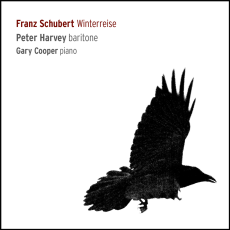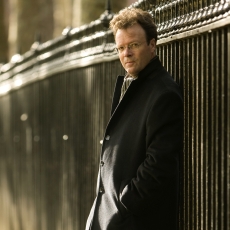Peter Harvey - Winterreise - MusicWeb International
The documentation accompanying this hybrid SACD is excellent,
except for one important detail. Some purchasers may get a bit
of a shock when they play the disc for the first time and discover
that, contrary to what is advertised on the jewel case and in
the booklet, Gary Cooper plays not on a modern piano but on
a fortepiano. This is an unfortunate slip since some listeners
may expect and wish to hear this music played on a modern concert
grand. In fact, Mr Cooper plays on a copy of an 1823 Brodmann
instrument. This we learn from the detailed and very interesting
booklet note by Peter Harvey himself.
I've long admired Peter Harvey, especially as one of the key
soloists in the Monteverdi Choir's Bach
Cantata Pilgrimage. Up to now I've associated him particularly
with music of the Baroque period but it seems he's now singing
more of the Song repertory. On the evidence of this disc that's
greatly to be welcomed.
Before discussing the singing I'd like to comment on the use
of a fortepiano. I should say straightaway that Gary Cooper's
playing seems to me to be both admirable and perceptive. I'm
much more accustomed to hearing Winterreise on a modern
concert grand but I've tried to listen to this performance with
an open mind. My feeling is that the use of the fortepiano produces
gains and losses. On the plus side there's definitely a good
clarity to the keyboard part - though Linn's superb recording
probably plays some part in this also. In some songs the period
instrument is a decided asset. In ‘Die Wetterfahne', for instance,
the instrument's tone is highly suggestive of the wind blowing
through the weathercock - and through everything else in its
path - and this contributes to a really turbulent rendition
of the song. Then in ‘Auf dem Flusse' not only is the rather
spooky tone of the fortepiano very atmospheric but also its
softer tone, as compared with a piano, allows Peter Harvey to
be, perhaps, more daring in his vocalisation in the first two
stanzas and the last one than a fuller tone of a piano might
let him be. The spooky instrumental tone is again a feature
of ‘Die Krähe' and though I thought I'd miss the tonal
weight of a piano in ‘Das Wirthaus' this proves not to be the
case. And, to conclude the "case for the defence", the fortepiano
is very effective in suggesting a hurdy-gurdy in ‘Der Leiermann'.
But there are times at which I couldn't help but miss the greater
tonal resources of a modern piano. It's true that the fortepiano
helps to deliver the Mozartian lilt and grace in parts of ‘Frühlingstraum'.
However, this was one of a few songs where I felt the instrument
rather tinkles in its higher register. The sustaining depth
of a modern piano is not quite there in ‘Die Nebensonnen' and
I wasn't completely convinced by the sound in the more turbulent
passages of ‘Der Lindenbaum'; in those sections there was more
than a suggestion of ‘twang'. I detected ‘twang' also in ‘Irrlicht'
and in this song something else is missing. In a recent review
of a performance of Winterreise at the Salzburg Festival,
Mark Berry pointed out the pre-echoes of late Liszt in Schubert's
harmonies in ‘Irrlicht'. That, I think, is a perceptive comment
but I don't think you'd make the connection when listening to
this present account.
On balance I'm inclined to think that the use of a fortepiano
in this performance is stimulating and in no way detracts from
the performance overall but it's right to lay out what strike
me as the pros and cons.
No need for pros and cons when discussing Peter Harvey's singing.
In a word it's magnificent. I can't readily recall a performance
in which dynamic contrast has been deployed so expertly and
to such telling effect. My listening notes are full of references
to Harvey's use of varied dynamics and I find his approach in
this connection to be wholly convincing. Another thing that
should be recorded is the clarity of his diction and what, to
my ears at least, sounds like flawless enunciation of the German
text. Perhaps we shouldn't be too surprised at this since Harvey
read French and German at university. His command of German
extends to providing the English translations in the booklet.
But it's the intelligence of his response to these songs and
his masterly singing of them that command the greatest respect.
Right from the start, in ‘Gute Nacht', the sheer quality and
expressive variety of his singing command attention. In ‘Erstarrung'
he evinces a manly desperation. I did wonder fleetingly, during
this song, if his voice is too mature to suggest a naïve youth
but this is all of a piece with what is often a dramatic and
highly charged reading.
There's strong, warm tone and excellent legato to savour in
‘Der Lindenbaum'. I love the control that Harvey brings to the
soft lines in ‘Wasserflut'. Everything is evenly produced, right
up into the higher regions of his voice. Moving further into
the cycle, there's an excellent account of ‘Die Krähe'
and I especially relished the expressiveness that Harvey brings
to the second stanza; here, as in many other parts of the cycle,
he really makes something of the words. His splendid, sustained
lines in ‘Der Wegweiser' are admirable as is his hypnotically
controlled delivery of ‘Das Wirthaus' - the last stanza of this
song is searingly powerful. The end of the cycle is mesmerising.
Harvey is magnificent in ‘Die Nebensonnen' and then manages
to be wonderfully expressive in ‘Der Leiermann' while at the
same time offering controlled, tonally withdrawn singing.
The sound quality is excellent. I listened to the conventional
CD format and was struck by the immediacy and impact of the
sound; I should imagine this is all the greater when one listens
in SACD format
The booklet contains some first class material, not least the
essay by Peter Harvey, who has also made the English translation
of the song texts. However, there's one very irritating feature.
The English translation follows the German text of each song,
which means that, maddeningly, one finds one or more stanzas
of the translation of several songs spread over onto the next
page. It may sound a trivial point but it isn't: why couldn't
the texts and translations have been printed side by side?
Notwithstanding that quibble and some reservations over the
fortepiano, which others may not share, this is an outstanding
account of Winterreise. As I said at the top of this
review, I've long admired Peter Harvey but I've not heard him
do anything finer than this. I hope it won't be long before
he records more song recitals to follow up this very distinguished
disc.


